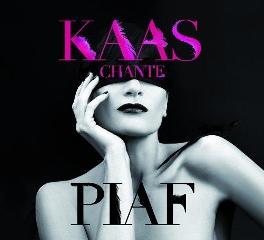Patricia Kaas – Kaas Chante Piaf (2012)
Patricia Kaas – Kaas Chante Piaf (2012)

01 Mon Dieu 04:43 02 Padam, Padam 04:39 03 Avec Ce Soleil 02:45 04 Milord 05:07 05 The 9th Hour 02:32 06 La Belle Histoire D'amour 04:14 07 Les Amants Merveilleux 02:37 08 T'es Beau Tu Sais 04:06 09 Hymne L'amour 04:21 10 C'est Un Gars 03:09 11 Song for the Little Sparrow 03:25 12 La Foule 03:56 13 Mon Mange Moi 03:01 14 La Vie En Rose 05:19 15 Non, Je Ne Regrette Rien 04:59 16 Je T'ai Dans La Peau 03:02 The Royal Philharmonic Orchestra Abel Korzeniowski - conductor
This is the recording studio version of the concert Patricia Kaas gave at Carnegie Hall in tribute to the 50th anniversary of Edith Piaf's passing. She is backed by the Royal Philharmonic Orchestra, a small studio band -- accordion, bass, guitar, Theremin, keyboards -- and even a chorus under the direction of Abel Korzeniowski, who also arranged the material and produced the album. The live performance, while a commercial success, had its share of critics, including Piaf purists, who were quick to note that Kaas doesn't possess the vocal range of her subject. Kaas fans found the size and power of the orchestra too daunting for her to overcome. Both of these arguments are likely to follow this studio production, but ultimately, both are in error. The cinematic quality provided by the orchestra and her band adds a haunting drama to these proceedings that points toward Kaas' smoky, sometimes even raspy, lower register. She doesn't attempt to imitate Piaf, but to pay homage to her enduring legacy and celebrate her influence. Kaas never betrays herself as a modern vocalist in the process. Instead, by interpreting these songs in her own way, she makes plain that Piaf's music is not only a root source of inspiration, but a breathing, evolving, entity that defies the limits of time and offers instruction for French chanson as it continues to evolve. Check the shifting moods and textures in "Mon Manege a Moi," the slow, smoldering sensuality and tragedy at the heart of her reading of "Mon Dieu," and the raw need expressed in "La Belle Histoire D'Amour," introduced and punctuated heavy brass, and alternately colored by a slow, strolling electric bass, piano, bells, and even a bass drum. The nod to Astor Piazzolla's nuevo tango in the accordion's introduction to "Non, Je Ne Regrette Rien" is a nice touch (Piaf loved tango, as does Kaas) is offset by pastoral strings in the backdrop, vamping on a series of three chords before the singer enters with the orchestra. The song unfolds as a reverie before becoming an anthemic celebration of life and love no matter its ultimate cost. It's unlikely that Kaas Chante Piaf will please "pure" fans of either woman; but then, it's not supposed to. In offering such a unique, sensitive, perhaps even iconoclastic interpretation of Piaf, Kaas underscores her own reputation as one of the great musical artists of our era. ---Thom Jurek ,Rovi
Na płytę "Kaas Chante Piaf" ("Kaas śpiewa Piaf") składa się 21 najsłynniejszych utworów francuskiej chansonistki w nowych aranżacjach polskiego kompozytora, Abla Korzeniowskiego. Wydawnictwo jest hołdem złożonym przez Patricię Kaas Edith Piaf.
Promując płytę Kaas wystąpi w największych salach koncertowych, m.in. w londyńskim Royal Albert Hall, nowojorskim Carnegie Hall, paryskiej Olympii a także w Seulu i Moskwie. W kwietniu wokalistka wystąpi w Warszawie, w Sali Kongresowej oraz wrocławskiej Hali Stulecia.
Patricia Kaas urodziła się w 1966 roku we francuskim Forbach. Rozgłos przyniosły jej piosenki "Mon mec a moi" i "Mademoiselle chante le blues", które stały się przebojami we Francji. W 1998 roku zdominowała francuską scenę muzyczną zdobywając sześć nagród "Victoires de la Musique". W 2002 roku zadebiutowała jako aktorka u boku Jeremy'ego Ironsa w obrazie Claude'a Leloucha "Piano Bar".
W 2008 roku powstał "Kabaret" - autorski spektakl Patrici Kaas, składający się z 20 utworów utrzymanych w stylistyce muzyki lat 30. W ciągu dwóch lat "Kabaret" wystawiono 145 razy w 35 krajach. Płyta z muzykę ze spektaklu sprzedała się w ponad 800.000 egzemplarzach na całym świecie. W 2011 roku prestiżowe wydawnictwo Flammarion opublikowało autobiografię piosenkarki "Cień mojego głosu". Książka została przetłumaczona na 6 języków.
Abel Korzeniowski to urodzony w Krakowie kompozytor muzyki filmowej i teatralnej. Skomponował ścieżkę dźwiękową do filmu "Samotny mężczyzna" w reżyserii Toma Forda. Jest laureatem nagrody Złotego Lwa podczas XXV Festiwalu Polskich Filmów Fabularnych za muzykę do filmu "Duże zwierzę" Jerzego Stuhra. Korzeniowski przygotował muzykę do takich produkcji jak: "Battle for Terra", "What We Take From Each Other", "Tickling Leo", "Confessions of a Go-Go Girl" a także "W.E." w reżyserii Madonny. --- muzyka.onet.pl
download (mp3 @ kbs):
yandex 4shared mega mediafire zalivalka cloudmailru oboom uplea
Zmieniony (Poniedziałek, 04 Styczeń 2016 21:21)








